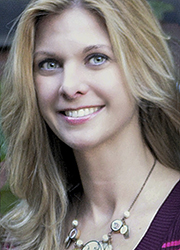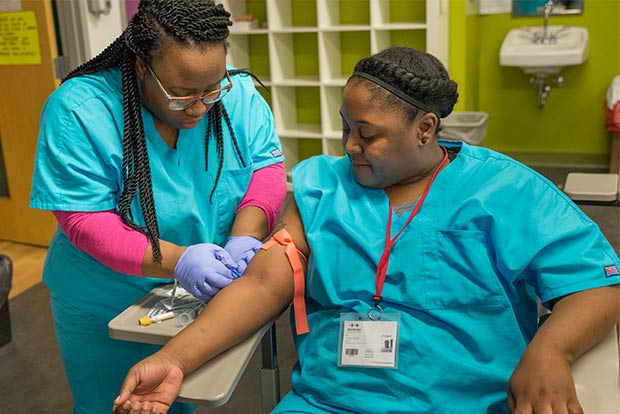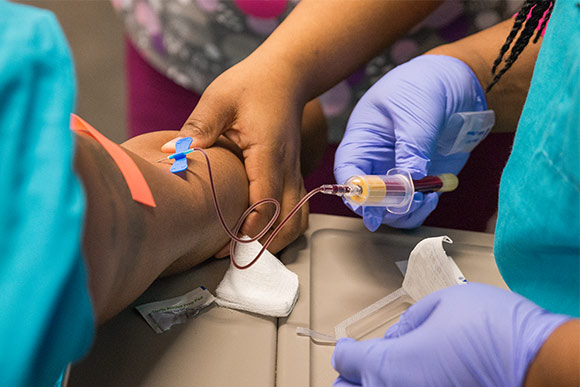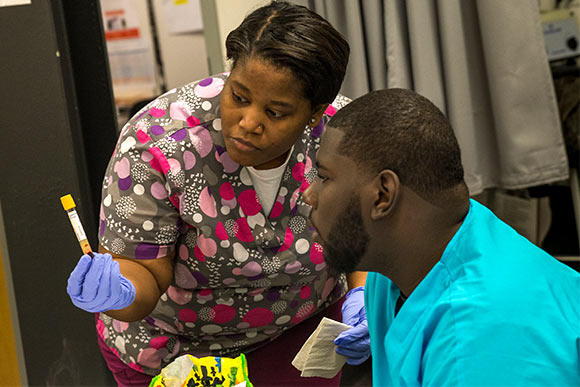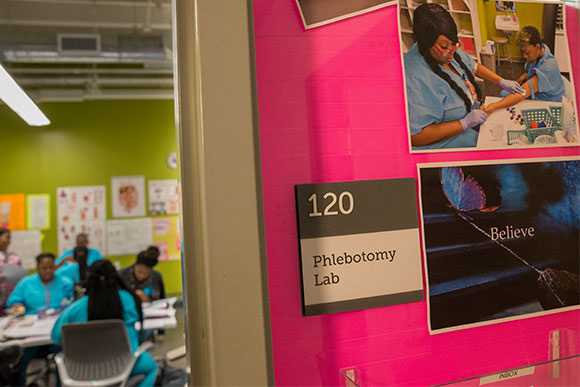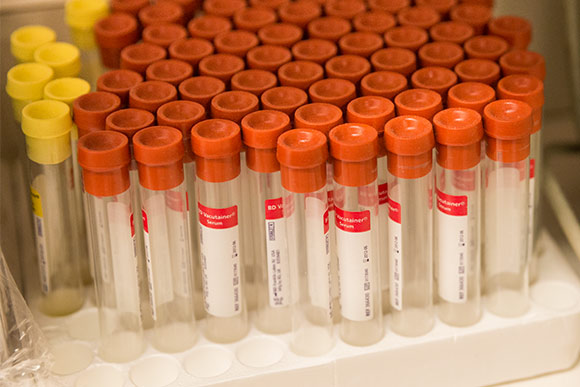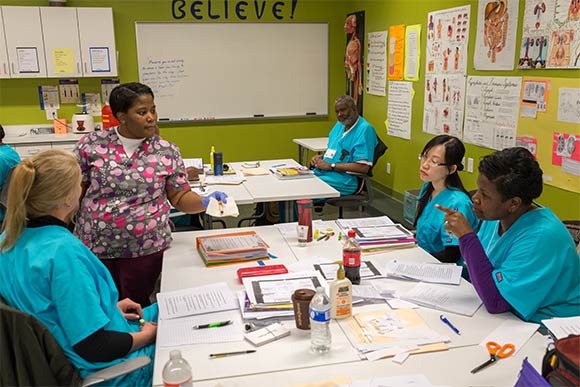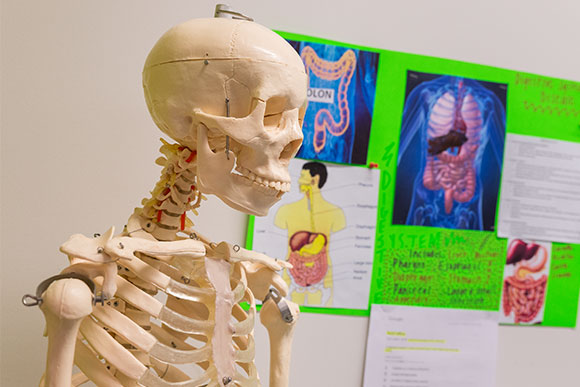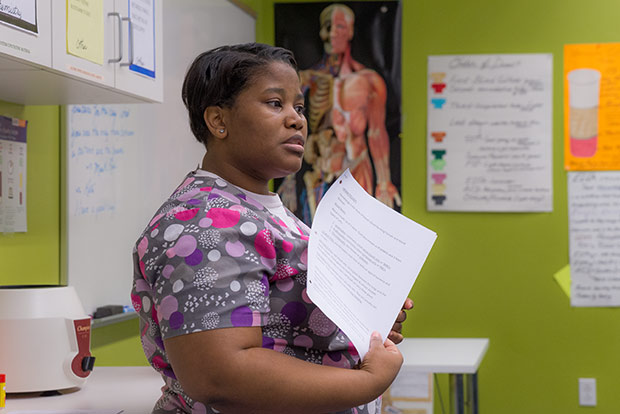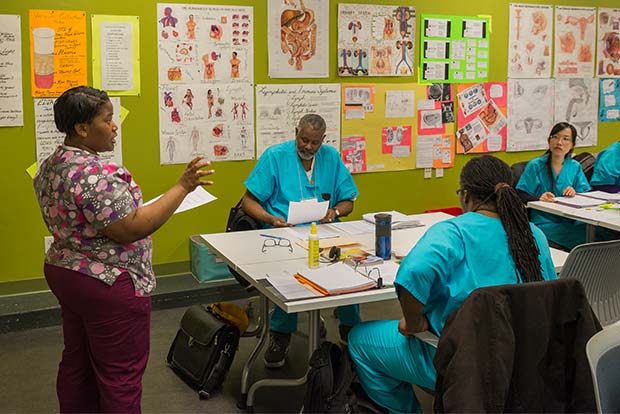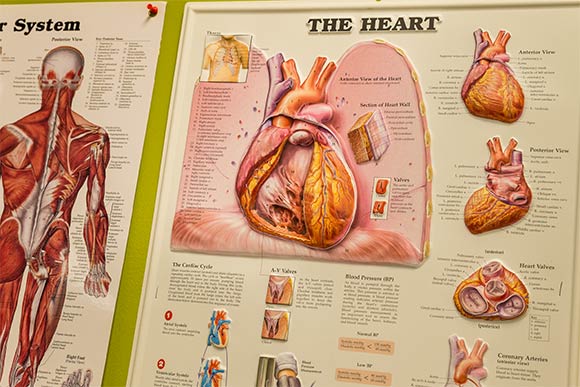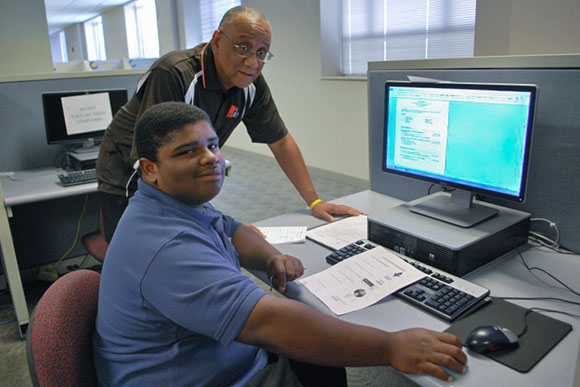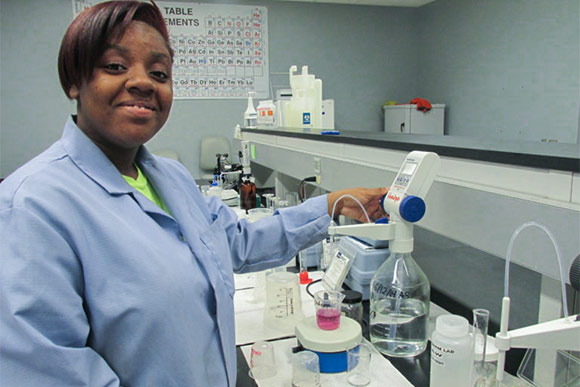Building bridges: connecting citizens to leading local employers
This series of stories, "Grassroots Success: Awakening the Power of Families and Neighborhoods," explores how meaningful impact on our communities grows from the ground up. Support for "Grassroots Success" is provided by Neighborhood Connections and NewBridge Cleveland Center for Arts & Technology.
Carlina Bowling wanted to improve her life after moving to Ohio from Virginia with her husband and six children. She wasted no time looking into getting a better job than her post in a Wal-Mart distribution warehouse. Having previously graduated from a medical assisting course in 2009, she knew what she wanted to do.
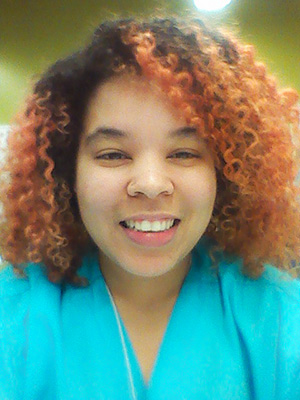 Carlina Bowling
Carlina Bowling
“When I was in that program, we had to cover phlebotomy, and I was just drawn to that part of it,” she says, adding that she wanted certification in the field and a subsequent career. She did some research and found that NewBridge Cleveland had some of the highest graduation and job placement rates in the area, so she applied.
“The classes are pretty cool,” she says. “They are very interactive, and the classroom is set up like a laboratory. Our teacher Kate is awesome. She absolutely loves what she does, and that made it a great experience for me," says Bowling, adding that she started last November, and has already graduated. She is quick to credit the support of her husband. "We make a great team," says Bowling. "I made it through working overnight and doing school early in the morning and still taking care of the kids.”
Her classes consisted of both group and individual work focusing on anatomy and terminology. Bowling also completed an externship at University Hospitals Broadview Heights Health Center.
In addition, NewBridge prepares students for writing resumes, participating in interviews, and following up with thank you letters.
“So that got us to be professional and to really seal the deal when it comes to a job,” says Bowling. “They encouraged us to begin sending applications before the externships because the process can take a while," she says, "and they gave us time on the computers to look for jobs and apply.”
Bowling is waiting to get her certification and has interviews lined up. If not for NewBridge, she believes she'd likely be stuck in the same job she had for the past 10 years.
“I definitely recommend the program to anyone trying to change their career and get in the medical field," notes Bowling. “The adult programs are awesome. They have great opportunities for everyone.”
NewBridge phlebotomy technician training consists of 180 classroom hours studying anatomy and physiology, phlebotomy procedure, CPR, basic computer skills, math, communication skills, conflict resolution, and professional development. Then students serve a four-week (160-hour) clinical training externship.
NewBridge began offering the phlebotomy program in 2011, raising 100 percent of the funding. Last year they formed a partnership with Ohio Means Jobs (OMJ). With dollars OMJ has allocated for dislocated and underemployed workers, the organization has been able to continue their free programs and add a welcome stipend during the externship portion.
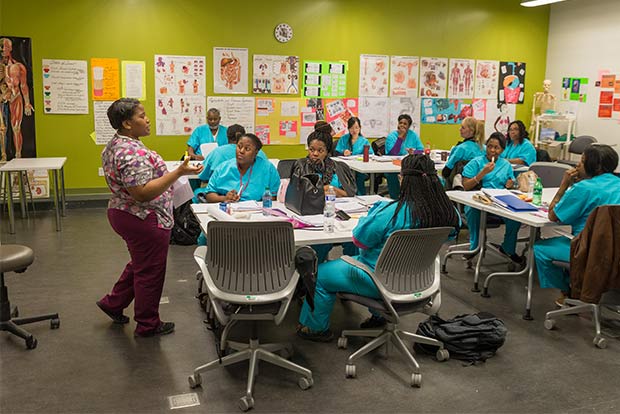 Phlebotomy Technician Program instructor Tenia Lee at NewBridge
Phlebotomy Technician Program instructor Tenia Lee at NewBridge
“That’s really important because although we cover all the costs of uniforms, books, materials and bus passes during our training program; we have not ever been able to offer a stipend,” Bethany Friedlander, acting executive director at NewBridge Cleveland, explains. “This means that there have been some financial hardships for students during the training period, which in phlebotomy is 14 weeks at 30 hours a week. At best you would be working part time, so it’s difficult with a family.”
There are 20 slots per session for students who qualify with OMJ; which requires opening a case with OMJ, meeting with an employment specialist, and showing an inconsistent work history. NewBridge also offers scholarships courtesy of raised foundation and corporate dollars and a partnership with Youth Opportunities Unlimited (YOU), which sends students to the program and reimburses them.
Friedlander says the multiple funding streams have allowed NewBridge to provide a wider variety of students with roughly $3,000 each in training and materials. Approximately 95 percent of the school's students are residents of Cleveland, which enhances programming in very real ways.
“What the hospitals have found is that patients get good care when they’re getting cared for by people who are their neighbors,” she says. “So the hospitals like to hire people from around their neighborhoods, and we like to provide them from around their neighborhoods.”
Addressing local needs: a two-way street
Based on Manchester Bidwell in Pittsburgh, NewBridge Cleveland provides job training and after-school arts programming for underprivileged adults and youth at no cost. In 2009, Ronn Richard of the Cleveland Foundation assembled an assessment team including Key Bank, University Hospitals, Cleveland Clinic, and others to survey the community’s needs. The study showed a great need for people to work in the healthcare industry, which was lacking qualified individuals. It also revealed pockets of concentrated poverty.
The aforementioned, along with the Kelvin and Eleanor Smith Foundation, provided the planning and seed money to establish NewBridge Cleveland. The training began with art for teens and pharmacy tech and phlebotomy for adults. In 2016, they added a nursing assistant course.
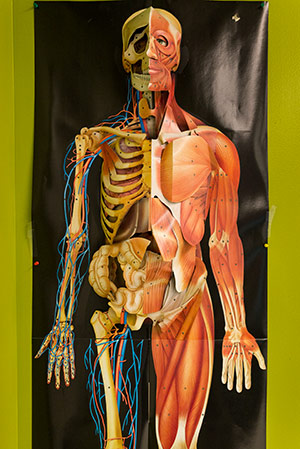
“Two things that makes us stand out in all of this is all of these courses are offered at no cost — technical training, externships, materials, books, testing — anything and everything that they need is provided at no cost, including transportation,” NewBridge Cleveland director of development Stephen Langel explains. “The other thing that makes us unique is that we looked at this need for health care, and we saw that the largest employers were the hospital systems by far. We are founded and have an incredibly close relationship with hospital systems, so when we put a program together, it’s done side-by-side with the leaders in policy at the hospitals," he says, adding that NewBridge consequently designs curriculums aimed specifically at employers needs, which gives its students an advantage over the competition when it comes to hiring.
"They live in the neighborhood and these are career path positions. It really puts them on a great path,” says Langel, noting that NewBridge has placed nearly 94 percent of its students over the past two years.
“We have had incredible support from Cleveland Clinic, University Hospitals, and MetroHealth. Every time we go through a class cycle we get feedback from the preceptors that have our students on their externships, and we know what’s working/what’s not working,” Friedlander adds. “They let us know if they’re going to change a policy or a procedure. So we’re able to very quickly change our curriculum, if need be, to best fit their needs.”
NewBridge strives to assemble an advisory committee with a variety of hospital representatives, including human resource employees who are responsible for filling particular positions and can offer interview advice, hiring managers who are building their own teams and representatives from the education wing who know exactly what someone is going to do on the job.
“We want to train someone for specifically what they’re going to do," Friedlander says. "We like to tie our curriculum to a portable credential because we think it’s important for people to have something tangible. [That] means you have to align your curriculum to whatever the standards are so they will pass their exams. If you do that well, you should be able to do a program in four to six months, which is really important because when the hospitals have a need — it’s legitimate, she says. "We have to be really nimble in the marketplace if we’re going to be a solution. Otherwise they’re going to find other solutions.”
A go-to source for local workforce training
NewBridge’s programs differ in length from the Manchester Bidwell model, which, for instance, includes a 13-month chemical laboratory technician program.
“We try to keep our training as short as possible so it’s the least amount of hardship on our students and they can get to work as soon as possible,” Friedlander says.
The adult division now annually graduates five phlebotomy technician classes, two pharmacy technician classes and five hospital nursing assistant classes.
“In 2016 we had 64 students in the adult program; in 2017 we’re going to have 206,” Langel says, adding that he expects that number to jump to 250 in 2018. "We began relatively small, then added teachers, new tracks, and expanded facilities. We had the room, the wherewithal, and the focus to take more people in. We’re expanding what we’re doing with the workforce program because it is working so effectively.”
He says an expansion to both the phlebotomy and hospital nursing assistance programs is driving the overall size of the school right now. NewBridge is also planning a six-month strategy to investigate other training tracks with less rigorous training and background checks.
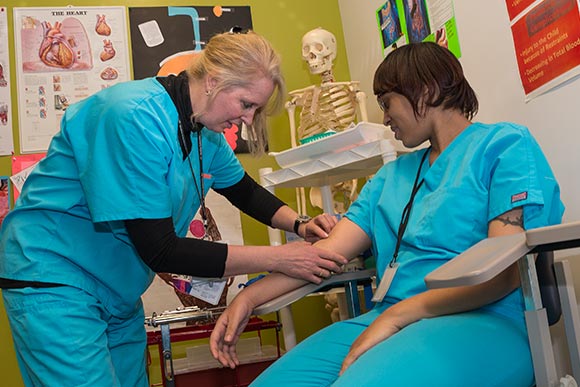 Phlebotomy Technician Program at NewBridge Cleveland
Phlebotomy Technician Program at NewBridge Cleveland
“We’re looking to not only expand our healthcare options but also to look at other fields where there might be a need, where we could provide a useful service in terms of training," says Langel. "Our idea is to be the sort of go-to source for workforce training especially for folks who are underprivileged, low-income, who can’t take on the kind of debt [or time] a for-profit [or] community college would require.”
Friedlander adds that through the years, NewBridge staff has honed their knowledge and improved the organization.
“We know what we’re doing. We know we get good results," she says. "We’ve really tightened our calendar. We’re keeping our breaks to a minimum so we can hold the maximum number of classes. Retention has been a challenge. Over 80 percent of the people we place are going to go to our hospital partners. The rest are going to go to a Quest laboratory. We’ve done some pilot retention studies with our hospital partners, and over 455 of our students are still there at 18 months and counting.
“We’d like to start at least one more program this year,” continues Friedlander. “We know that we shouldn’t completely silo ourselves into healthcare so we do have a commitment to try to create some new training that’s not in healthcare. One of the innovative trainings we started in 2016 — we partnered with Evergreen, which is another Cleveland Foundation-funded project — and we do all of their HR training modules," she says, adding that the noted sustainable cooperative collective did not have sufficient staff to cover the myriad sessions.
"For us, it’s about showing that we understand business needs," says Friedlander, "and so we’d like to do another training that’s in a non-healthcare related field this year in addition to continuing to build our relationships with the hospitals.”
"Providing an opportunity where there wasn’t one before"
Currently NewBridge Cleveland has 17 full- and part-time staff members including administrative staff, management instructors, and a full-time retention specialist who helps students find work, keep their jobs, and deal with any potential problems on the job. The average starting salary of graduates is close to $27,000. NewBridge graduates contribute at least $3 million back into the local economy every year, according to Langel.
“We’ve just recently started building a relationship with MetroHealth both in terms of hospital nursing assistants, but also in terms of trying to work with them to address the West 25th Street corridor,” he says. “So we’re starting to expand where we’re going in terms of training, and that is because of the partnership with MetroHealth."
Langel says NewBridge students often include people who do not have financial resources and feel as though they don't have much of a chance — or even much value. They may include single mothers, people going through different hardships and others who haven't had much luck with community college or other programs.
"Our greatest accomplishment is finding that population and providing an opportunity where there wasn’t one before," he says, "and being able to fundamentally change their lives in a short period of time.”
